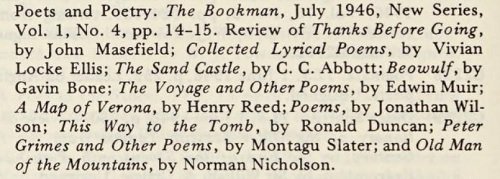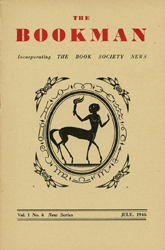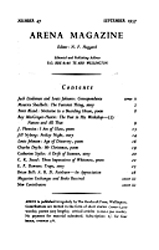|
|
Documenting the quest to track down everything written by
(and written about) the poet, translator, critic, and radio
dramatist, Henry Reed.
An obsessive, armchair attempt to assemble a comprehensive
bibliography, not just for the work of a poet, but for his
entire life.
Read " Naming of Parts."
|
Contact:
|
|
|
|
Reeding:
|
 |
I Capture the Castle: A girl and her family struggle to make ends meet in an old English castle.
|
 |
Dusty Answer: Young, privileged, earnest Judith falls in love with the family next door.
|
 |
The Heat of the Day: In wartime London, a woman finds herself caught between two men.
|
|
|
|
Elsewhere:
|
|
All posts for "Periodicals"
|
|
|
28.4.2024
|
Defying the notion that we have somehow already found everything written by Henry Reed to be found, up pops another book review in the June 3, 1944 issue of Time & Tide. (Reed reviewed Eliot's Four Quartets in December, that year, and I'm beginning to think he may have been something of a regular contributor.)
In this article, Reed critiques new poetry by three of his peers (or soon-to-be peers, since Reed's own volume of poetry, A Map of Verona, would not be published until 1946): John Heath-Stubbs, Julian Symons, and Terence Tiller.
POETRY
The Inward Animal: Terence Tiller. Hogarth. 3 s. 6 d.
Beauty and the Beast: John Heath-Stubbs. Routledge. 5 s.
The Second Man: Julian Symons. Routledge. 5 s.
in one of his poems Mr Symons says of himself:
"My poems are paper games, kicking a football,
Negative, disgraceful." This, though rather severe, is true. The word, "disgraceful" suggests something more vividly objectionable than anything Mr Symons has yet achieved, but "negative" and "paper games" are fair enough descriptions. "Paper games" is particularly apt; for here we have a characteristic contemporary volume of poems which very quietly, indeed almost unobtrusively, shuffles round and round those great concepts which Mr Auden has, by constant repetition of their names, so curiously reduced in seriousness: life, death, evil, corruption, sin, error, love, time and what not. The disposition of these little objects according to personal or fashionable taste is indeed a paper game, and a game available to anyone who cares to play it. Here is an example:
Our tears drop, the wet pearls are
Transformed into a voice
Crying: "O pity human
Nature condemned, to error,
And all those good who dare not
Descend like furious birds."
Weak as a baby walking
Conscience now moves and tells them
All inappropriate action
Leads on to wrong and death. Mr Heath-Stubbs and Mr Tiller are to be taken much more seriously. Mr Heath-Stubbs is at his best when he avoids traditional stanza-forms, which make him sometimes seem insincere and artificial, as in the various "songs" in his new volume; and even in the sequence of sonnets called The Heart's Forest, which deal with an important personal experience, the sonnet form is often used too lightly and casually. Nevertheless this sequence has some unusual and successful things in it: among them a sonnet beginning "Three walked through the meadows", and another on the theme of Echo and Narcissus. It is in Mr Heath-Stubbs's longer poems, usually written in a loose blank-verse, that one finds his best work: poems such as "Leporello", "Moscatos in the Galleys" and "Edward the Confessor", and a "Heroic Epistle" supposedly written from Congreve to Anne Bracegirdle. He is particularly good at identifying himself with a figure of the past, as Browning did; indeed he continues the Browning-Ezra Pound tradition. Here, presumably, is Liszt speaking:
'And the flutes ice-blue, and the harps
Like melting frost, and the trumpet marching, marching
Like fire above them, like fire through the frozen pine-trees
And the dancers came, swirling, swirling past me—
Plume and swansdown waving, while plume over the gold hair
Arms held gallantly, and silk talking—and an eye caught
In the candle-shadow, and the curve of a mouth
Going home to my heart (the folly of it!) going home to my heart!: Mr Tiller has forced on to his new volume of poems an order which appears to be rather false. The body of the book is a collection of lyrics, mainly meditations on emotions woken by a prolonged sojourn in Egypt. These he has written with all the customary fastidiousness, independence and conscientiousness. He is a poet who neither goes in for, nor comes out with, memorable lines or phrases. It is the atmosphere in his poems that one remembers—in a brilliantly composed poem such as Egyptian Dancer, for example, or in the poems called Desert:
Still where the viper swims in sand, the pearly
Scorpion stiffens, and the fast-mouthed surly
Lizards are—here, looking towards the waste,
We know more bare an importance than dust
Or the dry ant-clean specters that are born
Of it, venom of the scale and horn. He has flanked his collection of lyrics with two long poems, Eclogue for a Dying House, and The Birth of Christ. The former of these is intended to present the death of the old pre-war personality of the poet, the latter to present "slow mutual absorption ending in the birth of Something at once myself and a new self and Egypt". These poems, the most ambitious in the book, are the least successful—perhaps because they recall other poets very strongly, and Mr Tiller is good only when he is original. The Eclogue is a weary and powerless poem; its title and mode inevitably recall Mr MacNeice, but the poem is without Mr MacNeice's accomplished patina. The Birth of Christ employs a symbol too great for what Mr Tiller describes in his comment on the poem; and Rilke has been too unscrupulously impressed into helping in the writing of it.
henry reed
|
1537. Radio Times, "Full Frontal Pioneer," Radio Times People, 20 April 1972, 5.
A brief article before a new production of Reed's translation of Montherlant, mentioning a possible second collection of poems.
|
Finally, I have a contemporary review of Henry Reed's debut book of poems from 1946, by a critic who should need no introduction: a World War I poet; the editor of John Clare, Wilfred Owen, and Ivor Gurney; the "true cricketer": Edmund Blunden.
Blunden's review comes from the July, 1946 issue of The Bookman. In scouring the Internet Archive library for references to Reed, we unexpectedly find an entry in A Bibliography of Edmund Blunden, by B.J. Kirkpatrick (Oxford: Oxford University Press, 1979), on page 458, for "Poets and Poetry":
In this two-page, whirlwind summation, Blunden reviews no fewer than ten books of verse, devoting a paragraph to each: Thanks Before Going, by John Masefield; Collected Lyrical Poems, by Vivian Locke Ellis; The Sand Castle, by Claude Colleer Abbott; Beowulf, translated by Gavin Bone; The Voyage and Other Poems, by Edwin Muir; Poems, by Jonathan Wilson; This Way to the Tomb, by Ronald Duncan; Peter Grimes and Other Poems, by Montagu Slater; Old Man of the Mountains, by Norman Nicholson; and, of course, A Map of Verona, by Henry Reed.
Blunden holds Muir, Wilson, and Slater in high enough esteem to quote a few stanzas. As for Reed, Blunden reproduces no lines, but he does have this to say:
A group of poems entitled 'Lessons of the War' strikes me as being the most expressive part of Mr. Henry Reed's book. He also has his poems on subjects of ancient fame, such as 'Philoctetes,' but they do not announce his originality so boldly as the pieces mentioned, which have captured something of the time-spirit and ambiguity of the recent war in a style of wit and deep feeling united. This is high praise for the original, three-part sequence of Reed's war poems: "Naming of Parts," "Judging Distances," and "Unarmed Combat." Especially high coming from Blunden, a WWI veteran and survivor of the Somme and Ypres. For certain, these are the poems which cemented Reed's reputation and continue to this day to keep him in the Canon. If Blunden could only spare a a few lines for Reed, this paragraph speaks volumes.
|
1536. L.E. Sissman, "Late Empire." Halcyon 1, no. 2 (Spring 1948), 54.
Sissman reviews William Jay Smith, Karl Shapiro, Richard Eberhart, Thomas Merton, Henry Reed, and Stephen Spender.
|
An antipodean appearance of Henry Reed, in the Wellington, New Zealand literary magazine Arena (Noel Farr Hoggard, ed.), from March, 1958, where Roy MacGregor-Hastie wrote a contentious, four-part series of articles on the state of poetry, titled "The Poet in His Workshop."
MacGregor-Hastie first mentions Reed in Part 2 of his series, "The Vertical Men" (from the Auden poem, "Let us honour if we can / The vertical man, / Though we value none / But the horizontal one"):
There is little of the morbid, though a great deal of the introspective in the writing of Henry Reed, who I should have liked to have included in this article as a vertical man. However, he is at an angle of ninety degrees to himself, so I shall leave him for the Miscellaneous section of this series, and deal with Alexander Tvardovsky, a contemporary Soviet poet.Arena, no. 46 (March 1957): 18. The promised Reed finally arrives in Part 4, "The Great Unclassified," where MacGregor-Hastie places Reed in a European miscellany, after Alfredo Panzini, Giuseppe Ungaretti, and Joaquín de Entrambasaguas (I can only guess: MacGregor-Hastie has written "Juan de Estrembasagua"), but only after thoroughly bashing the old guard—Auden, Eliot, Stephen Spender, and C. Day-Lewis—for their complacency and selling-out:
In England the work of any poet who is unfortunate enough to be under thirty is ignored completely, anyway by the larger publishers; if in the nineteenth century poets had to be both famous and dead before they were owned by their families, in the twentieth century, after the pre-war flood of slim volumes of garnered fancies, publication of verse has dried up. Only the little magazines can guarantee to the dedicated poet any frequency of publication, and their solvency is not always as great as one would wish; the Listener, the New Statesman and Nation, the Times Literary Supplement—these are the major media now and only publish the sort of verse you would expect....
There is probably only one man who remains cheerful through it all and unperturbed by the commercialism and disinterest he finds in the world of the Arts. His name is Henry Reed and he is sui generis, unclassified and unclassifiable. He published a collection of poems in 1946 called the 'Map of Verona', which established him in English Literature as perhaps the only living poet who could have written Lawrence's 'Innocent England' and write more; he published in this collection a series of poems about the war itself and the duality of experience of the sensitive soldier, his preoccupation more with the trivial detail of Army life than with the consequences to some other person's family of his firing the rifle—he is at such pains to be clean in the regulation way. In one of these poems, 'Naming of Parts' he shows his extreme sensitivity and ability to approach the emotional through the every day experiences of the world of trivia. He is being taught the names of the parts of his rifle, and the beauty of his surroundings intrudes into the lesson:
. . . . rapidly backwards and forwards
the early bees are assaulting the flowers;
They call it easing the Spring.
They call it easing the Spring: it is perfectly easy
if you have any strength in your thumb:
like the bolt and the breech and the cocking piece, and the point of balance,
which in our case we have not got; and the almond blossom
silent in all of the gardens, and the bees going backwards and forwards
For today we have naming of parts. And that is my epilogue. The most valid commentary on this our civilisation so-called, which tries to live without the Arts, which are its flowers—
the point of balance
which in our case we have not got. Arena, no. 48 (March 1958): 12-13. MacGregor-Hastie's respect and appreciation for Reed is laudable, if a bit idealized: Reed, even as early as the late 1950s, was hardly remaining 'cheerful' and 'unperturbed', and he probably would have taken more than some offense at the author's rough-handling of his friends, Spender and Day-Lewis—not to mention his idols and authorities, Auden and Eliot.
|
1535. Reed, Henry. "Talks to India," Men and Books. Time & Tide 25, no. 3 (15 January 1944): 54-55.
Reed's review of Talking to India, edited by George Orwell (London: Allen & Unwin, 1943).
|
|
|
|
1st lesson:
Reed, Henry
(1914-1986). Born: Birmingham, England, 22 February 1914; died: London, 8
December 1986.
Education: MA, University of Birmingham, 1936. Served: RAOC, 1941-42; Foreign Office, Bletchley Park, 1942-1945.
Freelance writer: BBC Features Department, 1945-1980.
Author of:
A Map of Verona: Poems (1946)
The Novel Since 1939 (1946)
Moby Dick: A Play for Radio from Herman Melville's Novel (1947)
Lessons of the War (1970)
Hilda Tablet and Others: Four Pieces for Radio (1971)
The Streets of Pompeii and Other Plays for Radio (1971)
Collected Poems (1991, 2007)
The Auction Sale (2006)
|
Search:
|
|
|
Recent tags:
|
Posts of note:
|
Archives:
|
Marginalia:
|
|











